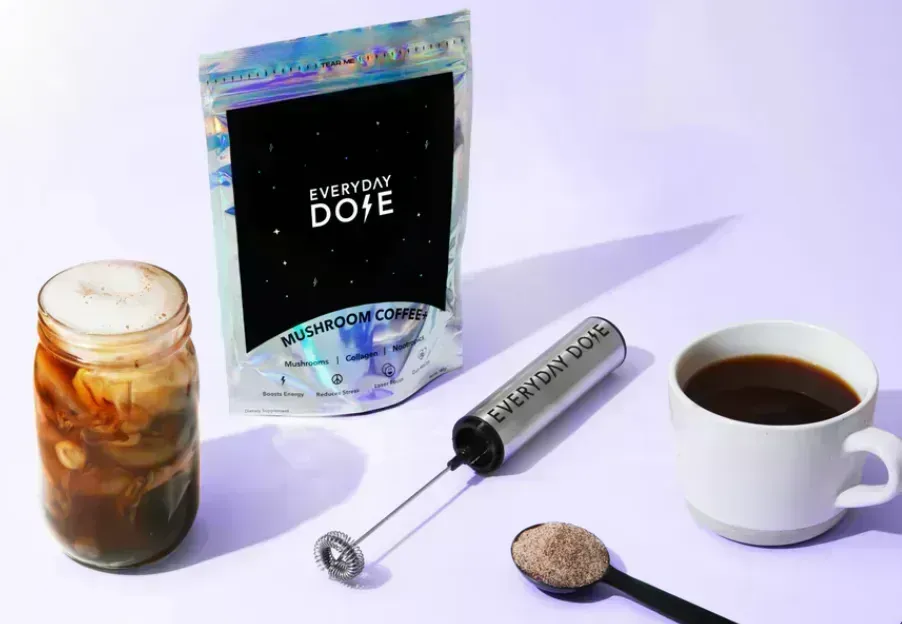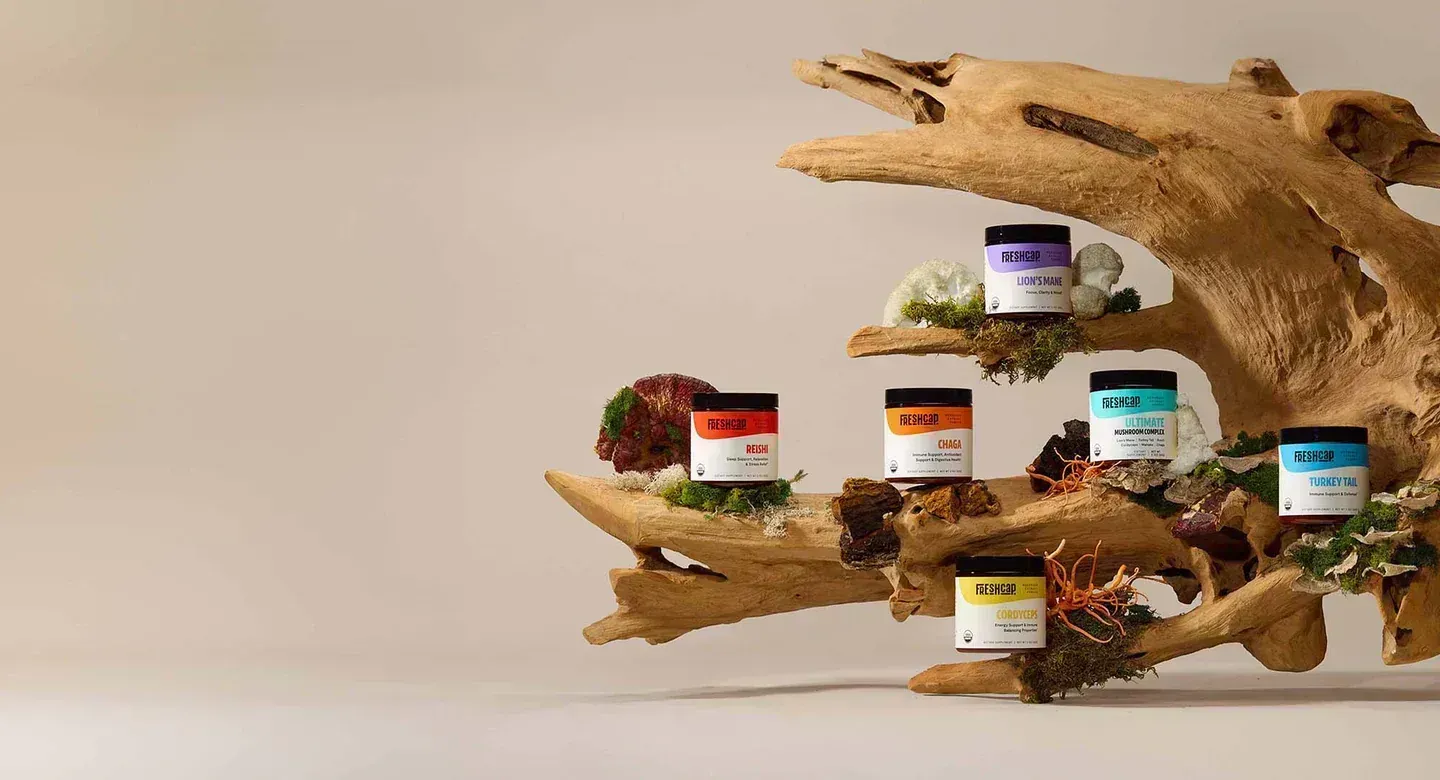I think I can speak for everyone and say that getting good sleep is important. Sleep is vital for our well-being, yet millions struggle to get enough of it. Some people turn to traditional sleep aids like melatonin or prescription medications, but even at times those tend to fail us. A natural remedy rising in popularity seems to be the way people are getting their sleep using more of a holistic approach. Medicinal mushrooms, often hailed as adaptogens, offer incredible potential to enhance sleep quality. From reducing stress to balancing hormones, I can even say that these fungi may hold the key to better rest.
In this Fungi Review blog, we’ll explore the top mushrooms for sleep, their benefits, and how to incorporate them into your nightly routine.
Why Choose Mushrooms for Sleep?
Medicinal mushrooms are packed with bioactive compounds that help the body adapt to stress, improve immunity, and restore balance. Unlike pharmaceuticals that may cause dependency or side effects, mushrooms work gently to support the body’s natural sleep processes. They are rich in antioxidants, polysaccharides, and other compounds that regulate stress hormones, reduce inflammation, and support relaxation.
Top Mushrooms for Better Sleep
1. Reishi (Ganoderma lucidum): The Queen of Mushrooms
Reishi, often called the “mushroom of immortality,” has been revered in traditional Chinese medicine for centuries for its restorative and calming effects. Modern research highlights its potential in improving sleep by targeting the root causes of insomnia, such as stress, anxiety, and hormonal imbalance. Reishi has a distinctly bitter and earthy flavor, which can be intense for some. Its bitterness comes from the triterpenoids and other bioactive compounds that contribute to its calming effects.
- Reducing Stress: Stress is one of the primary culprits behind poor sleep quality. Reishi contains compounds like triterpenes, which help regulate cortisol, the stress hormone. Lower cortisol levels create a calmer mental state, making it easier to drift off to sleep
. - Improving Relaxation: Beyond stress reduction, reishi enhances relaxation by promoting gamma-aminobutyric acid (GABA) activity in the brain. GABA is a neurotransmitter that slows brain activity, helping to reduce feelings of anxiety and prepare the body for sleep.
- Enhancing Sleep Quality: Studies suggest that reishi can improve both the duration and quality of deep sleep (slow-wave sleep), the most restorative stage of the sleep cycle. This can help improve energy levels, cognitive function, and overall health upon waking
How to Use: Add reishi powder or extract to a warm cup of chamomile or lavender tea about an hour before bed. This combination enhances the calming effects, creating a perfect bedtime beverage.
2. Lion’s Mane (Hericium erinaceus): For Cognitive and Sleep Health
Lion’s Mane is widely celebrated for its cognitive benefits, but it also plays a vital role in improving sleep quality by targeting underlying issues like inflammation and nerve health. Lion’s Mane offers a mild, nutty flavor with a slight seafood-like undertone, reminiscent of lobster or crab when fresh. As a powder or extract, it is subtler and blends well into lattes, teas, or creamy beverages without overpowering the flavor.
- Reducing Inflammation: Chronic inflammation disrupts the body’s natural sleep rhythms. Lion’s Mane’s potent anti-inflammatory properties, attributed to its polysaccharides and antioxidants, can alleviate this disruption, creating a more conducive environment for restful sleep.
. - Supporting Nerve Health: This mushroom promotes the production of nerve growth factor (NGF), a protein crucial for maintaining healthy brain and nerve cells. By supporting the nervous system, Lion’s Mane helps regulate sleep cycles and mitigate sleep disorders often linked to neurological imbalances.
How to Use: Incorporate Lion’s Mane into a creamy nighttime latte by blending the powdered form with warm almond milk, honey, and a pinch of cinnamon. This soothing drink doubles as a sleep enhancer and a brain tonic.
3. Chaga (Inonotus obliquus): The Antioxidant Powerhouse
Chaga, often referred to as the “king of medicinal mushrooms,” is best known for its ability to boost immunity and combat oxidative stress. These properties also make it an excellent ally for better sleep. Chaga has an earthy, slightly woody taste with hints of vanilla. Its smooth flavor profile makes it ideal for tea, often brewed into a rich, dark beverage resembling coffee.
- Balancing Stress Hormones: Chaga’s adaptogenic properties help the body adapt to physical and emotional stress, lowering cortisol levels and promoting relaxation.
. - Enhancing Melatonin Production: By supporting hormonal balance, Chaga indirectly aids in melatonin production, the hormone responsible for regulating the sleep-wake cycle. This makes it easier to fall asleep and stay asleep.
.
How to Use: Brew a cup of Chaga tea by simmering Chaga chunks or powder in water. Its earthy flavor pairs well with a hint of honey or vanilla extract, making it an excellent choice for an evening wind-down ritual.
4. Cordyceps (Cordyceps sinensis): Energy Balancer
Cordyceps is commonly associated with boosting energy and stamina, but its ability to regulate energy levels can also improve sleep by ensuring a natural balance between activity and rest. Cordyceps has an earthy, slightly umami flavor that can be masked easily in smoothies or mixed with cocoa-based drinks. Its taste is milder than reishi, making it versatile for both sweet and savory recipes.
- Regulating Energy Levels: Cordyceps helps maintain steady energy throughout the day, reducing mid-afternoon fatigue that often leads to disrupted sleep patterns. A balanced energy level promotes a consistent sleep schedule
. - Supporting Oxygen Uptake: This mushroom enhances the body’s ability to utilize oxygen efficiently, which is particularly beneficial for athletes or individuals with physical stress. Proper oxygenation during sleep enhances recovery and overall restfulness
How to Use: Mix Cordyceps powder into a post-dinner smoothie with calming ingredients like banana, almond butter, and a splash of oat milk. This will help prepare your body for restorative sleep.
5. Turkey Tail (Trametes versicolor): Gut Health and Sleep
Turkey Tail is celebrated for its role in supporting gut health, which is directly linked to sleep quality. The gut-brain connection plays a critical role in regulating mood and sleep patterns. Turkey Tail’s flavor is quite mild but slightly mushroomy and woody. It is most commonly consumed in tea form, where it can be paired with herbs like peppermint or lemon balm to create a soothing bedtime blend.
- Supports Microbiome Health: Turkey Tail acts as a prebiotic, feeding beneficial gut bacteria that produce neurotransmitters like serotonin. Since serotonin is a precursor to melatonin, a healthy gut can significantly enhance sleep quality.
- Boosts Immunity: Stress and illness can disrupt sleep cycles. Turkey Tail’s immune-boosting polysaccharides help reduce the body’s stress response, promoting a calmer state conducive to rest.
How to Use: Blend Turkey Tail powder into a soothing herbal tea with ingredients like peppermint or lemon balm. This tea can help settle both the gut and mind before bed.
The Science Behind Mushrooms and Sleep
The effectiveness of mushrooms lies in their adaptogenic properties. Adaptogens help the body manage physical and mental stress, which are often the culprits of poor sleep. For instance:
- Cortisol Regulation: High cortisol levels at night can lead to insomnia. Mushrooms like reishi and Chaga help lower cortisol levels, allowing the body to relax.
- Inflammation Reduction: Chronic inflammation is linked to sleep disturbances. Medicinal mushrooms combat this with their potent anti-inflammatory compounds.
- Melatonin Support: Some mushrooms, such as Chaga, indirectly boost melatonin production by supporting overall hormonal balance.
How to Incorporate Mushrooms into Your Nightly Routine
1. Teas and Elixirs
Brewing mushroom tea is a simple and soothing way to wind down. Combine your preferred mushroom powder with calming herbs like chamomile or lavender for added benefits.
2. Capsules and Supplements
For those who prefer convenience, capsules offer a quick and effective way to get your daily dose of sleep-supporting mushrooms.
3. Mocktails
Create a sleep-friendly mocktail with mushroom extracts, tart cherry juice, and magnesium-rich coconut water. These ingredients promote relaxation without the negative effects of alcohol.
4. Recipes
Incorporate mushrooms into your evening meals. For example, a warm mushroom soup with reishi or a dessert smoothie with Lion’s Mane can double as a sleep aid.
Related blog: Reishi Tea Review
Related blog: Lion’s Mane Tea Review
Tips for Improving Taste
Some of you may be skeptical of the taste of mushroom as being earthy and bitter, while that may be true the taste can be easily masked and super worth it once you get a recipe that you like! So here's some personal suggestions to improve the taste.
- Sweeten Naturally: Use natural sweeteners like honey, stevia, or maple syrup.
- Combine with Spices: Add warming spices like cinnamon, nutmeg, or ginger for added depth.
- Mix with Familiar Flavors: Blending mushroom powders into cocoa, matcha, or herbal teas can make the flavors more approachable.
- Experiment with Milk: Creamy plant-based milks like oat, almond, or coconut milk can enhance the texture and mask bitterness.
With a little creativity, you can turn these functional fungi into delicious nightly rituals that not only support better sleep but also satisfy your palate.
Lifestyle Tips to Maximize the Benefits
Pair your mushroom regimen with these tips for optimal sleep:
- Create a Relaxing Environment: Dim the lights and avoid screens at least an hour before bedtime.
- Stick to a Schedule: Go to bed and wake up at the same time daily to regulate your body’s internal clock.
- Avoid Stimulants: Limit caffeine and sugar intake in the evening.
Final Thoughts: A Natural Path to Restful Sleep
Medicinal mushrooms offer a gentle yet effective way to improve sleep quality. Whether you’re battling stress-induced insomnia or simply looking to enhance your rest, incorporating these fungi into your nightly routine could be a game-changer. With their adaptogenic properties and versatility, mushrooms like reishi, Lion’s Mane, Chaga, Cordyceps, and Turkey Tail provide a holistic approach to achieving restful nights.
So, why not trade your traditional nightcap for a calming mushroom tea or a sleep-enhancing mocktail? Your body—and your dreams—will thank you.
Check out our other blogs here!





